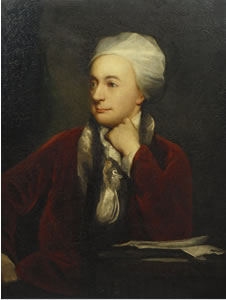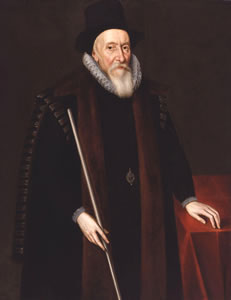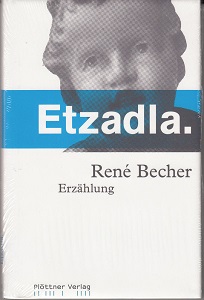De Engelse dichter William Cowper werd geboren op 26 november 1731 in Berkhamstead, Herford. Zie ook alle tags voor William Cowper op dit blog.
Abuse Of The Gospel
Too many, Lord, abuse Thy grace
In this licentious day,
And while they boast they see Thy face,
They turn their own away.
Thy book displays a gracious light
That can the blind restore;
But these are dazzled by the sight,
And blinded still the more.
The pardon such presume upon,
They do not beg but steal;
And when they plead it at Thy throne,
Oh! where’s the Spirit’s seal?
Was it for this, ye lawless tribe,
The dear Redeemer bled?
Is this the grace the saints imbibe
From Christ the living head?
Ah, Lord, we know Thy chosen few
Are fed with heavenly fare;
But these, — the wretched husks they chew,
Proclaim them what they are.
The liberty our hearts implore
Is not to live in sin;
But still to wait at Wisdom’s door,
Till Mercy calls us in.

William Cowper (26 november 1731 – 25 april 1800)
Portret door William Henry Jackson, 1873
De Engelse schrijver en acteur Theophilus Cibber werd geboren op 26 november 1703 in Londen. Zie ook alle tags voor Theophilus Cibber op dit blog.
Uit: The Lives of the Poets of Great Britain and Ireland (Thomas Sackville, Earl of Dorset)
“Thomas Sackville, Earl of Dorset was son of Richard Sackville and Winifrede, daughter of Sir John Bruges, Lord of London. He was born at Buckhurst in the parish of Withiam in Suffex, and from his childhood was distinguished for wit and manly behaviour: He was first of the University of Oxford, but taking no degree there, he went to Cambridge, and commenced master of arts; he afterwards studied the law in the Inner-Temple, and became a barrister; but his genius being too lively to be confined to a dull plodding study, he chose rather to dedicate his hours to poetry and pleasure; he was the first that wrote scenes in verse, the Tragedy of Ferrex and Perrex, sons to Gorboduc King of Britain, being performed in the presence of Queen Elizabeth, long before Shakespear appeared on the stage, by the Gentlemen of the Inner-Temple, at Whitehall the 18th of January, 1561, which Sir Philip Sidney thus characterises: “It is full of stately speeches, and well founding phrases, climbing to the height of Seneca’s stile, and as full of notable morality, which it doth most delightfully teach, and so obtain the very end of poetry.” In the course of his studies, he was most delighted with the history of his own country, and being likewise well acquainted with antient history, he formed a design of writing the lives of several great personages in verse, of which we have a specimen in a book published 1610, called the Mirror of Magistrates, being a true Chronicle History of the untimely falls of such unfortunate princes and men of note, as have happened since the first entrance of Brute into this Island until his own time. It appears by a preface of Richard Nicolls, that the original plan of the Mirror of Magistrates was principally owing to him, a work of great labour, use and beauty.”

Theophilus Cibber (26 november 1703 – oktober 1758)
Portret van Thomas Sackville door John De Critz the Elder, voor 1647
Onafhankelijk van geboortedata
De Duitse schrijver Alyosha Brell werd geboren in 1980 in Wesel. Zie ook alle tags voor Alyosha Brell op dit blog.
Uit: Kress
„Sehr geehrter Herr Ullstein,
mit beträchtlichem Befremden habe ich Ihre Absicht zur Kenntnis genommen, dieser Tage ein Buch mit dem Titel „Kress“ zur Veröffentlichung zu bringen. Nicht nur heißt dieses Buch so wie ich. Aufgrund der Informationen, die im sogenannten „World Wide Web“ darüber verfügbar sind, muss ich davon ausgehen, selbst sein Protagonist zu sein. Durch die Veröffentlichung Ihres Buchs sehe ich meine eigenen Persönlichkeitsrechte und darüber hinaus die eines mir bekannten Tauberichs empfindlich gestört.
Nun spricht vom Grundsatz her nichts gegen ein Buch über meine Person. Tatsächlich begrüße ich Ihr Unterfangen ausdrücklich, halte es für nicht weniger als angemessen, dass man sich in schriftlicher Form mit meiner Person auseinandersetzt – wenngleich ich eine gewisse Verwunderung über den Zeitpunkt der Veröffentlichung nicht verbergen möchte. Immerhin haben meine Beiträge zur Goetheforschung, die unzweifelhaft Anlass Ihres Buches sind, ihren Weg in die Fachöffentlichkeit bislang nicht gefunden. Entschieden wehren muss ich mich allerdings dagegen, dass dieses Buch nicht von mir selbst, sondern von Ihrem Autor, Herrn Aljoscha Brell, verfasst wurde. Ich habe Erkundigungen über Herrn Brell eingezogen. Es handelt sich bei ihm, verzeihen Sie mir die deutlichen Worte, um einen Nichtskönner höchsten Grades, dessen größte Errungenschaft darin besteht, als Siebzehnjähriger im Schultheater einige Sätze fehlerfrei aufgesagt zu haben. Es ist mir vollkommen schleierhaft, wie Sie dazu kommen, einer solchen Maximalpflaume wie Herrn Brell ausgerechnet meine Biografie anzuvertrauen.“

Alyosha Brell (Wesel, 1980)
De Omaanse dichter Mohamed Al-Harthy werd geboren in al-Mudhayrib, Oman, in 1962. Zie ook alle tags voor Mohamed Al-Harthy op dit blog.
CHINESE MAGIC
Before my morning exercise
I took to stealing a glance
at the wise man sitting cross-legged
(in his painting done in Chinese ink)
near the door of the room.
When I return, exhausted, an hour later
I take three or four cookies out of the package
and prepare a cup of tea with milk,
which I drink in peace
with the first—and last—
cigarette of the morning.
The wise man of the painting,
which bears one of the Chinese Emperor’s red seals,
is not content with stealing glances,
and stares right at me through the smoke
with his two piercing eyes.
I’m so embarrassed that I don’t see his hand
as it reaches, stealthily, from the painting
to open the shutters:
a small bird from the neighbor’s garden
lands on the table
and steals some crumbs
as soon as I leave to water my plants.
The neighbors’ bird and I are thieves no longer.
We’re friends now, so steeped
in this wisdom
that one of us, this morning,
is writing a poem
while the other flaps its wings
in front of the painting on the wall—
in twin gratitude to our master,
the wise man of the painting.
Vertaald door Kareem James Abu-Zeid

Mohamed Al-Harthy (al-Mudhayrib, 1962)
De Duitse schrijver René Becher werd geboren in 1977 in Bayreuth. Zie ook alle tags voor René Becher op dit blog.
Uit: Etzadla.
„Und ich stelle mir vor, wie ich um den Maibaum tanze, mit einem Veibsbild, das ich nicht kenne, nicht mag,hineingeworfen in eine Situation, die mir wieder nicht recht ist, so stehe ich dann da, wie sonst immer nur zwischen den beiden Pfosten in der Schule, und die Bälle knallen nur so an einem vorbei und so weiter.
„Du musst schon auch mal an dich ranlassen.“ Hat selbst Vater öfter gesagt. Und ich. Ich habe nicht an mich rangelassen.
Die Mutter lacht. Ich höre sie doch laut und deutlich lachen. Steht da an der Theke, die Arme vor dem Bauch verschränkt, schickt ihren Jüngsten, Christian, weg, amüsiert sich ganz prächtig. Ihr senffarbenes, zuhause vor dem Spiegel schön geklopftes Sommerkleidchen.
Eine Brosche am Busen, eine dunkle Brille im Haar. Der Schwankwirt stülpt einen unsauberen Krug über den Spülboy, flllp! Die Mutter wiehert. Sie wiehert wie ein junges Fohlen, das auf der Koppel auslaufen darf. Arme, schöne, junge Frau, so sagen sie doch. Hat es auch nicht gerade leicht. ]a gerade jetzt. Zwei Kinder am Hals, und der Vater ist ihnen allen abhanden gekommen.
Adler begibt sich unter den Limonadenschirm. Einer von uns. Spendet ein paar warme Worte. Ein Prediger vor dem Herrn, so heißt es wohl. Er steht unter dem Limonadenschirm, das Thesenpapier in der Hand, ein Mikrofon: „Was für ein schöner Tag“, und streicht sich die wenigen grauen Haare aus dem Gesicht: „Frühlingsgefühle, und später Supertombola!“

René Becher (Bayreuth, 1977)
Cover
